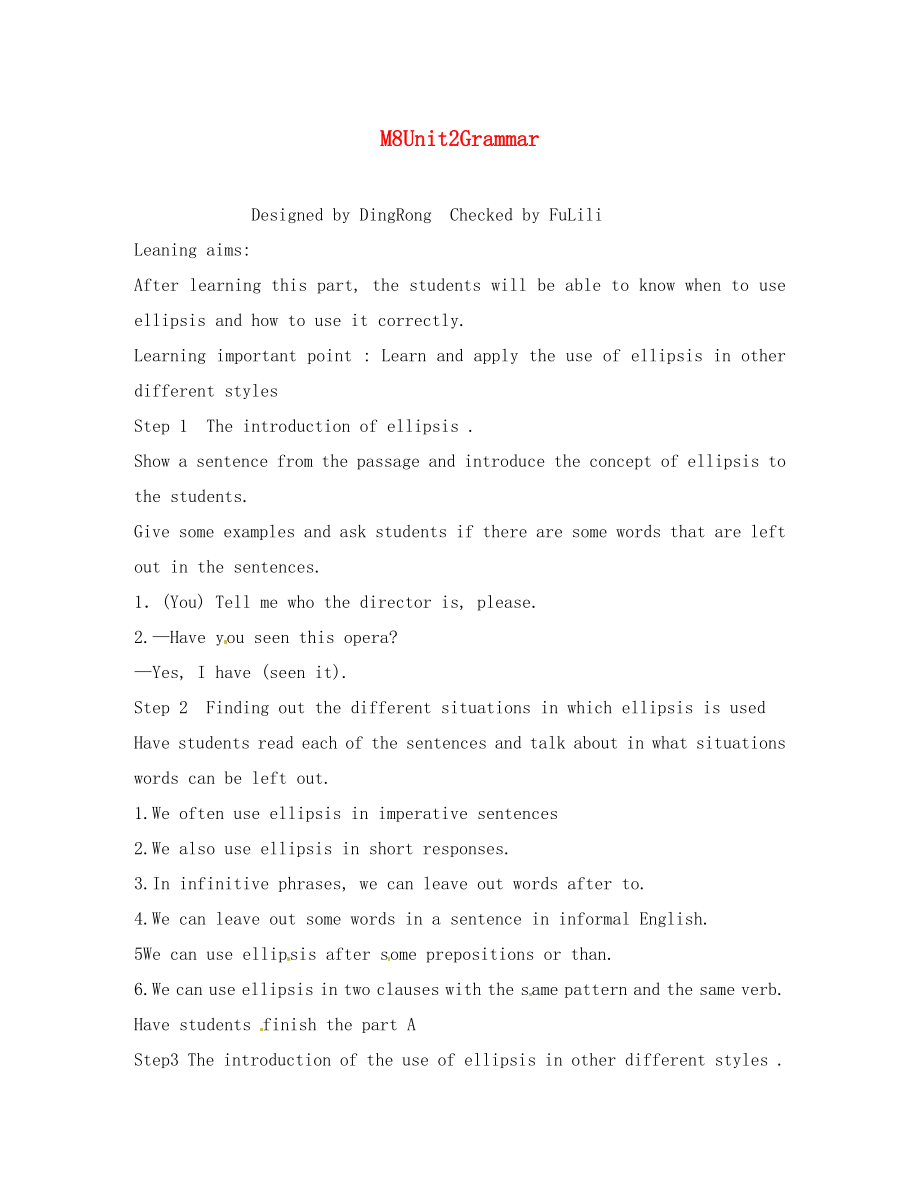《江蘇省徐州市建平中學(xué)高二英語(yǔ) M8 Unit2 Grammar 學(xué)案》由會(huì)員分享�,可在線閱讀,更多相關(guān)《江蘇省徐州市建平中學(xué)高二英語(yǔ) M8 Unit2 Grammar 學(xué)案(4頁(yè)珍藏版)》請(qǐng)?jiān)谘b配圖網(wǎng)上搜索�����。
1���、M8Unit2Grammar
Designed by DingRong Checked by FuLili
Leaning aims:
After learning this part, the students will be able to know when to use ellipsis and how to use it correctly.
Learning important point : Learn and apply the use of ellipsis in other different styles
Step 1 The introduction of
2���、 ellipsis .
Show a sentence from the passage and introduce the concept of ellipsis to the students.
Give some examples and ask students if there are some words that are left out in the sentences.
1.(You) Tell me who the director is, please.
2.—Have you seen this opera?
—Yes, I have (seen it).
3����、Step 2 Finding out the different situations in which ellipsis is used
Have students read each of the sentences and talk about in what situations words can be left out.
1.We often use ellipsis in imperative sentences
2.We also use ellipsis in short responses.
3.In infinitive phrases, we can leav
4�����、e out words after to.
4.We can leave out some words in a sentence in informal English.
5We can use ellipsis after some prepositions or than.
6.We can use ellipsis in two clauses with the same pattern and the same verb.
Have students finish the part A
Step3 The introduction of the use of ellipsi
5�����、s in other different styles .
In some special styles of ellipsis, words are left out to save space and time. These include signs and labels, newspaper headlines, instructions, postcards and diaries, notes, etc.
Finish the next matching
Signs: Houses destroyed in weekend storms
Inst
6����、ructions: These are bright ideas.
Headlines: No smoking is allowed here.
Notes: Please handle this with care.
Postcards: I wish you were here.
Step 4 Show students some complete sentences and have the students rewrite them using ellipsis.
Rewrite the
7、following sentences with ellipses.
1. What about some more coffee for you?
2. Why do you get so upset?
3. Why do you not do it at once?
4. It’s a pity you didn’t get the chance.
5. —Shall I go to play badminton?
—If you like, you can go to play badminton.
一��、單項(xiàng)選擇����。
1. —Alice, why didn’t you co
8、me yesterday?
—I ________, but I had an unexpected visitor.
A. had B. would C. was going to D. did
2. Dr. Black comes from either Oxford or Cambridge, and I can’t remember ________.
A. where B. there C. which D. that
3. The man we followed suddenly stopped and looked as if ________
9��、whether he was going in the right direction.
A. seeing B. having seen C. to have seen D. to see
4. —Tom, did Mr. Li join you in your discussion?
—No, he _________, but he happened to have fallen ill.
A. would like to B. was to have C. will D. was going to join
5. ________, I think, and t
10�����、he problems could be settled.
A. If you double your efforts B. So long as you keep up your spirits
C. Making greater efforts D. A bit more efforts
6. —Have you been here long?
— ________.
A. No, not very B. Not much C. Yes, only little D. No, only yesterday
7. —Have you fed the dog?
11、
—No, but __________.
A. I am B. I’m C. I’m just going to D. I’m just going
8. I asked him to go to the concert, but he didn’t _________.
A. want B. want it C. want to D. want to go
9. —Alice feels better today.
—I think she __________.
A. will B. will be C. does D. does so
12�����、10. He may not be at home, then ________, leave him a note.
A. if not so B. if he is C. if he not D. if so
11. The book, ________, appeals to many adult readers, too.
A. it was written for children but B. though which was written for children
C. was written for children D. though written
13����、for children
12. If you don’t go, ________.
A. neither shall I B. neither do I C. neither am I D. either shall I
13. —Will you be able to finish the job this month?
— ________.
A. I can’t say so B. I’m not sure so C. I don’t know so D. I don’t expect so
14. — Do you want to come with us?
— ________.
A. I prefer no B. I prefer not to C. I don’t prefer D. I don’t prefer so
15. When ________, the museum will be open to the public next year.
A. completed B. completing C. being completed D. to be completed
 江蘇省徐州市建平中學(xué)高二英語(yǔ) M8 Unit2 Grammar 學(xué)案
江蘇省徐州市建平中學(xué)高二英語(yǔ) M8 Unit2 Grammar 學(xué)案

